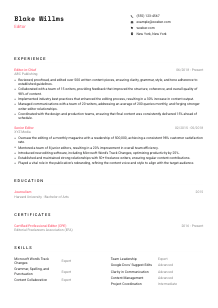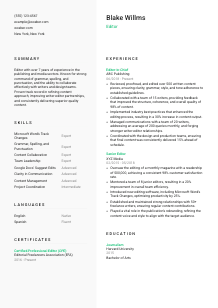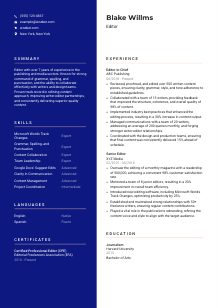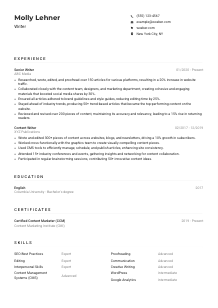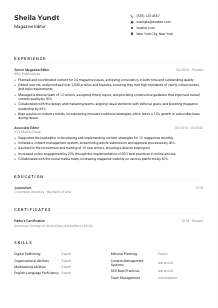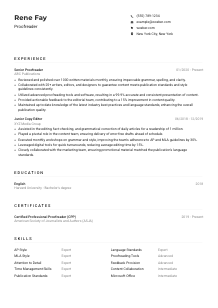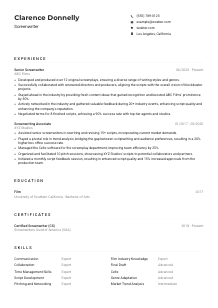Editor Resume Example
Polishing prose, but your resume feels rough around the edges? Dive into this Editor resume example, edited with Wozber free resume builder. Discover how easily you can harmonize your editorial finesse with job demands, crafting a career narrative that flows as smoothly as your best manuscripts!
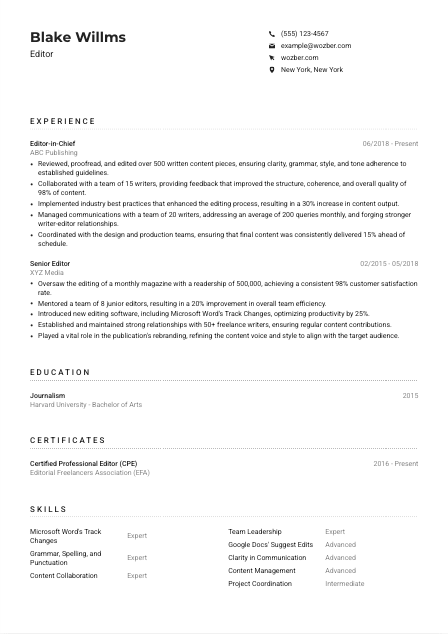
How to write an Editor Resume?
Hello, future Editor virtuoso! If you're eager to carve a niche in the publishing or media world, your resume is your first chapter in the story of success. What if we told you that with the right approach, this chapter could be a bestseller? With the help of Wozber's free resume builder, we'll guide you step by step to create a resume that not only meets the job specifications but also passes with flying colors through any Applicant Tracking System (ATS).
Ready to pen down a career-defining resume? Let the storytelling begin!
Personal Details
The opening lines of any great book set the tone for the adventure ahead. Similarly, your Personal Details section is your grand entrance into the job market. Let's set the scene in a way that would make any hiring manager eager to read on.
1. Name with Flair
Think of your name as the title of your masterpiece. Make it stand out with a readable font that promises the content of quality. This is your headline, your moment to shine before the hiring manager delves deeper.
2. Job Title Alchemy
Just below your name, work the alchemy that turns your position into gold. For instance, if the job description seeks an "Editor," position this title front and center on your resume. It's a subtle nudge that says, 'I am exactly what you're looking for.'
3. The Connection Coordinates
Include your most accessible contact details but ensure accuracy. A typo in your email or phone number is like a spelling mistake on the first page of a novel – it might make the reader put it down. Your professional email should be simple - firstname.lastname@email.com speaks volumes.
4. Locational Advantage
"Must be located in New York, New York." This job description requirement sounds like a stage direction. Follow it to the letter by prominently noting your New York, New York address, cutting the need for relocation questions and showing you're already part of the scene.
5. Digital Presence
Linking a professional website or a LinkedIn profile can add depth to your character sketch, offering a multidimensional look at your professional narrative. Just ensure it mirrors the storyline you're telling with your resume.
Takeaway
Your Personal Details section is the prologue to your professional saga. Through clarity, precision, and strategic positioning, you've laid the groundwork for a captivating read. Step onto the stage with confidence, knowing you've already aligned with the role's basic requirements.





Experience
This is where the main plot unfolds. Your experience in the editing world reveals volumes about your capabilities. Let's curate it to not only capture the essence of your professional journey but also detail its impact, resonating perfectly with the job for which you're applying.
- Reviewed, proofread, and edited over 500 written content pieces, ensuring clarity, grammar, style, and tone adherence to established guidelines.
- Collaborated with a team of 15 writers, providing feedback that improved the structure, coherence, and overall quality of 98% of content.
- Implemented industry best practices that enhanced the editing process, resulting in a 30% increase in content output.
- Managed communications with a team of 20 writers, addressing an average of 200 queries monthly, and forging stronger writer‑editor relationships.
- Coordinated with the design and production teams, ensuring that final content was consistently delivered 15% ahead of schedule.
- Oversaw the editing of a monthly magazine with a readership of 500,000, achieving a consistent 98% customer satisfaction rate.
- Mentored a team of 8 junior editors, resulting in a 20% improvement in overall team efficiency.
- Introduced new editing software, including Microsoft Word's Track Changes, optimizing productivity by 25%.
- Established and maintained strong relationships with 50+ freelance writers, ensuring regular content contributions.
- Played a vital role in the publication's rebranding, refining the content voice and style to align with the target audience.
1. Analyzing the Manuscript
Begin by deconstructing the job description. For the Editor role, grasp the nuances of requirements like "A minimum of 3 years of professional editing experience" or "Proficiency in using editing software". These are your guideposts.
2. Structuring Your Narrative
Frame your narrative with precision. Start with your latest role, mentioning your job title, the company name, and the period of your tenure. This chronological structure offers a clear, compelling flow of your professional growth.
3. Crafting Accomplishment Statements
Each role you list should be a story of achievement. For instance, "Reviewed, proofread, and edited over 500 written content pieces..." showcases not just duty but dedication and impact. Subtly mirror the language used in the job description for a narrative resonance.
4. Embedding Metrics of Success
Quantify your accomplishments to give them weight. For example, a '30% increase in content output' or 'consistent delivery 15% ahead of schedule' lends credibility and scale to your expertise, making your contributions tangible and noteworthy.
5. Relevant Tale-Telling
While it might be tempting to tell all, focus on the experiences that closely align with the job at hand. Tailor your tales to fit the narrative sought by your potential employer. This isn't just editing; it's strategic content refinement.
Takeaway
Your Experience section is where your professional story comes to life, resonating with potential employers through a showcase of your relevant achievements. Make each word count, for in the details of your professional past lies the key to your future success.
Education
While the world of editing thrives on experience, your educational background sets the stage, offering a glimpse into your foundational knowledge. Let's ensure it aligns perfectly with the script provided by the job description.
1. Identifying the Script
The job requires a "Bachelor's degree in Journalism, English, Communications, or a related field." Match your educational history with this criterion, ensuring your degree is prominently displayed. This immediate alignment sets a confident tone.
2. Simple and Clear Narration
Lay out your educational journey with clarity. Start with your most recent degree, listing the field of study, the degree obtained, and the institution followed by the year of graduation. This straightforwardness respects the reader's time and attention.
3. Highlighting the Relevant Plot Points
If your degree perfectly aligns with the job's specifications, like a "Bachelor of Arts in Journalism," it should be given the spotlight. This direct correlation showcases your specific preparation for the role's demands.
4. Adding Depth with Relevant Courses
Tailor your Education section further by listing relevant courses that have prepared you for the Editor role. This level of detail enriches your narrative, providing proof of your dedication to your craft.
5. The Subplot: Achievements
If your academic journey includes notable milestones – honors, extracurricular activities, or a thesis that resonates with the Editor role – mention them. This adds layers to your character, showing aspects of leadership, research, and initiative.
Takeaway
Your Education section isn't just a list of qualifications; it's the backstory to your professional narrative. Craft it with care, ensuring it provides a snapshot of your dedication and the foundation upon which your editing career is built.
Certificates
In the fast-evolving publishing and media landscape, continuous learning is key. Certificates are badges of your commitment to staying ahead. Let's ensure they shine brightly on your resume, complementing your story.
1. Selecting the Key Chapters
Start by reflecting on the certificates that best align with the job description. For our Editor role, while certifications weren't explicitly required, showcasing ones related to editing, publishing, or even specific software proficiency adds value.
2. The Relevant Badges of Honor
Only list certificates that build upon the narrative you're aspiring to tell. For instance, a "Certified Professional Editor" directly echoes the role's demands, positioning you as a dedicated expert committed to your craft.
3. Time-stamping Your achievements
When your achievement is time-sensitive, including dates is essential. It showcases your most recent endeavors and commitment to staying updated, vital in a field as dynamic as editing.
4. A Continuous Quest for Knowledge
The industry doesn't stand still, and neither should you. Emphasize your ongoing quest for growth by mentioning any recent or ongoing certification efforts. It's a testament to your proactive approach to personal and professional development.
Takeaway
Your collection of certificates is a mosaic of your professional development journey, spotlighting your dedication to refining your craft. By strategically selecting and presenting these achievements, you underscore your commitment to excellence in the world of editing.
Skills
Your skills section is where you itemize the tools of your trade. From grammar savviness to adeptness at collaboration, each skill you list is a testament to your editing acumen. Let's tailor this list to the job description, turning it into a showcase of your editing prowess.
1. Dissecting the Job Script
Carefully extract the skills hinted at or directly mentioned in the job description. Abilities such as "Strong command of the English language," "Proficiency in using editing software," and the capacity for "team collaboration" are your keywords.
2. Matching Your Arsenal
Contrast and compare your skill set with what's requested. Highlight the skills that best match, and prioritize them on your resume. Terms like "Microsoft Word's Track Changes Expert" and "Content Collaboration Expert" directly align with the job's needs.
3. Organizing Your Tools
While it's tempting to flood this section with every skill under the sun, focus on quality over quantity. Prioritize those most relevant to the Editor role, ensuring your resume speaks directly to the hiring manager's needs.
Takeaway
The Skills section is a compact exhibit of your editing toolkit. Curate it thoughtfully, emphasizing skills that elevate you above the manuscript pile. It's this section that can position you as the perfect protagonist for the Editor role.
Languages
In the realm of editing, your command over language is your superpower. The ability to wield words with precision in various tongues can set you apart in a crowded field. Let's articulate your linguistic prowess in a way that enhances your narrative.
1. Scouting the Terrain
"Strong command of the English language" is a stated requirement. If this is your forte, place it at the pinnacle of your language list. Your rating as a 'Native' speaker or 'Expert' in English will be a beacon to recruiters.
2. Listing Your Dialect Arsenal
Beyond the primary requirement, each language you speak is a testament to your versatility. Consider the spectrum of your linguistic abilities – could speaking Spanish or Mandarin offer an edge in a diverse team or global publishing environment?
3. Authenticity in Proficiency
Honesty is paramount when rating your language skills. Whether you're 'Fluent,' 'Intermediate,' or 'Basic,' a straightforward representation ensures expectations align with reality.
4. Reading the Role's Map
Understanding the scope of the role helps in tailoring this section. For exclusively English-speaking roles, the emphasis will be less on diversity and more on mastery. However, additional languages could signal potential for future roles or projects.
5. A Global Citizen
Each language you speak is a doorway to a new world of understanding. Emphasize your linguistic capabilities as tools for better communication, broader comprehension, and enhanced connectivity in a globally intertwined industry.
Takeaway
Your linguistic abilities are not just proficient; they're your passport to storytelling on a global stage. Flaunt your command over language(s) with pride, knowing that each one adds a unique color to your professional palette.
Summary
Your resume's summary is akin to the blurb of a book – it needs to capture interest and intrigue in equal measure. For an Editor, it's about balancing the narrative of your professional journey with a glimpse of your personality. Let's craft a summary that's as compelling as the best opening lines.
1. Deciphering the Theme
First, understand the essence of what the Editor role demands. With a clear grasp of the job requirements, you can start painting a picture of yourself not just as a qualified candidate but as the leading character for the position.
2. Setting the Scene
Introduce yourself with a statement that encapsulates your professional ethos. For example, ‘Editor with over 7 years of experience in the publishing and media sectors' immediately sets the stage for your depth of expertise.
3. Highlighting the Plot Twists
Now, illuminate your unique qualities and achievements. Mention your ‘strong command of grammar, spelling, and punctuation,' and your ‘ability to collaborate effectively.' These are the hooks that will keep the hiring manager reading.
4. Keeping the Mystery
While it's important to be thorough, remember that the summary is just a teaser. You want to leave hiring managers curious and eager to learn more about you, prompting them to dive into the narrative depths of your resume.
Takeaway
Consider your summary the highlight reel of your professional story – it's your chance to dazzle and intrigue. By carefully tailoring it to the Editor role, aligning it with the job's requirements, you set the tone for a resume that commands attention.
Launching Your Editor Journey
Congratulations! You've now crafted a resume that's not just a document but a narrative journey tailored to the role of an Editor. Each section, carefully woven with Wozber's guidance, has been optimized for ATS and designed to spark interest. Your resume is your opening act in the professional world of publishing and media.
Harness the power of Wozber's free resume builder, complete with ATS-friendly resume templates and an ATS resume scanner, and turn your resume into an invitation for opportunity. The next chapter awaits. Let it be grand!

- Bachelor's degree in Journalism, English, Communications, or a related field.
- A minimum of 3 years of professional editing experience, preferably within a publishing or media setting.
- Strong command of the English language with exceptional grammar, spelling, and punctuation skills.
- Proficiency in using editing software, such as Microsoft Word's Track Changes or Google Docs' Suggest Edits.
- Demonstrated ability to work in a team and communicate effectively with writers, ensuring clarity and consistency in written content.
- Must be located in New York, New York.
- Review, proofread, and edit written content for clarity, grammar, style, and tone, ensuring it adheres to established guidelines.
- Collaborate closely with writers to refine and polish content, providing feedback on structure, coherence, and overall quality.
- Stay updated with industry best practices and implement appropriate changes to the writing and editing process.
- Manage communications with writers, addressing any queries or concerns pertaining to their work.
- Coordinate with design and production teams to ensure timely delivery of final content.





